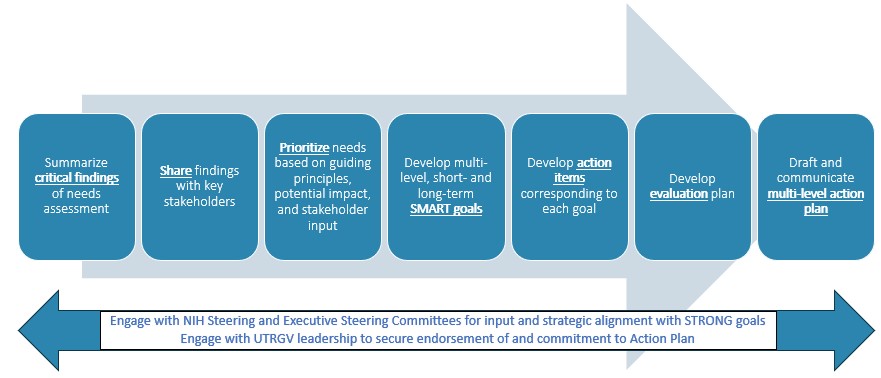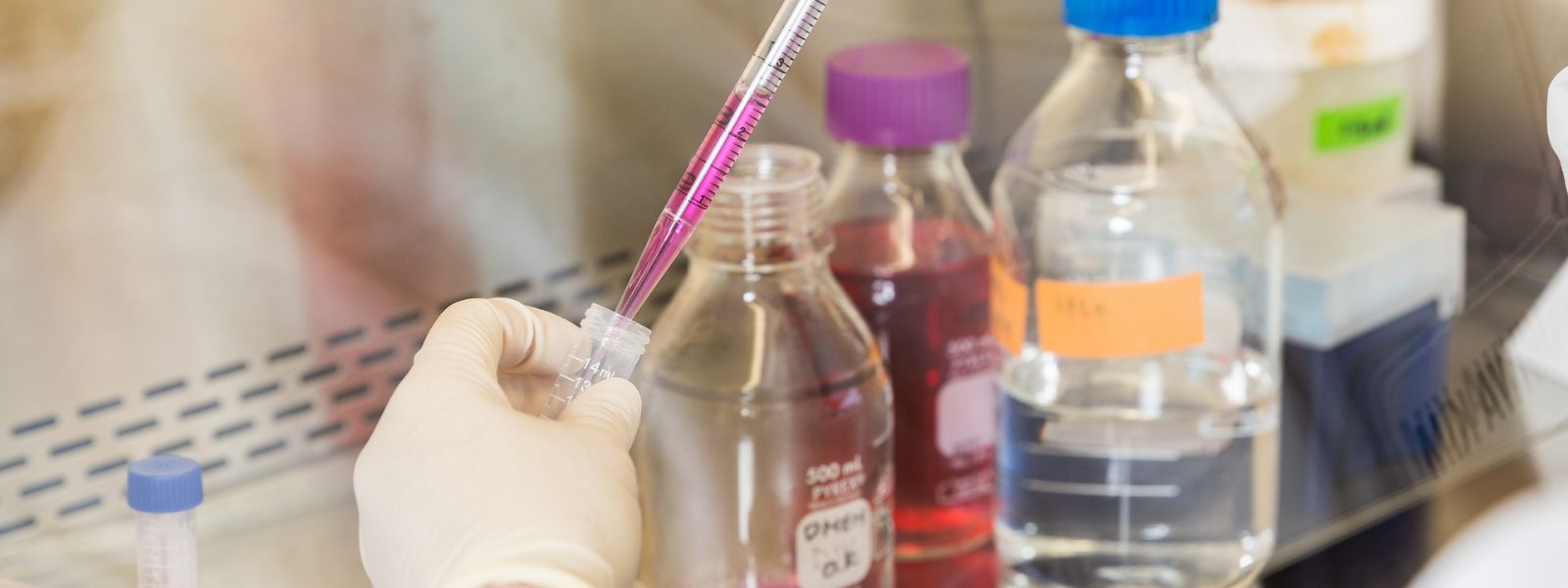Reaching New Heights: Strengthening Health Professions Research at UTRGV is an interdisciplinary initiative to strengthen biomedical, clinical, behavioral, and social sciences (collectively termed “biomedical”) research within health professions at UTRGV.
The project is funded by a grant award (1UC2AI188568-01) from the National Institutes of Health’s (NIH) STrengthening Research Opportunities for NIH Grants (STRONG): Structured Institutional Needs Assessment and Action Plan Development for Resource Limited Institutions (RLIs).
The STRONG initiative is led by the College of Health Professions (Michael Lehker, PI) and is in collaboration with the School of Nursing, School of Social Work, and the Department of Psychological Science.
For more information about the STRONG initiative and its components, click on the related links on the left or contact us at STRONG@utrgv.edu.
Although health professions (HP) – allied health, nursing, social work, clinical psychology – represent more than 80% of the healthcare workforce, rigorous research within these fields, a cornerstone of evidence-based practice, is often trailing behind that of other medical professions. The urgency of closing this gap is amplified for health professionals practicing in communities characterized by poverty, low educational attainment, health care access challenges and, consequently, poor health outcomes. Thus, building and strengthening HP biomedical research capacity is vital to improving health.
The long-term goal of the STRONG initiative is to foster a robust HP research environment conducive to high-quality, cutting-edge biomedical research.
Guided by a conceptual framework that integrates multiple levels and domains of influence, our aims are:
- Engage the UTRGV HP community in a structured, comprehensive research needs assessment that delineates the interactions and feedback loops among levels and domains of research capacity and productivity.
- Develop a corresponding action plan characterized by clear, feasible, measurable, sustainable, and institutionally championed action items that support high-quality, cutting-edge biomedical research.
Our team will conduct a structured and comprehensive research needs assessment to inform the development of an action plan that will meet these needs and strengthen health professions research capacity. The needs assessment includes five components.
- Environmental scan
- Analysis of research-related policies and procedures
- Faculty research capacity & needs assessment
- Institutional research support
- Student research support
Our team, informed by the findings of the needs assessment and guided by various stakeholders, will develop an action plan to strengthen the research productivity of health professions faculty, with a focus on community relevant health research.
Guiding Principles
- Responsiveness to identified needs
- Institutional commitment
- Feasibility
- Alignment with institutional mission and existing research capacity
- Sustainability
- Flexibility
- “From bench to bedside to community” research
Action Plan Development Process

Michael Lehker, PhD, PI
Dean, College of Health Professions
Dr. Lehker serves as the Principal Investigator (PI) on the STRONG award.
Dr. Lehker has 30 years of teaching, research, and administrative experience at majority Hispanic-Serving institutions, with 15 years of consecutive leadership experience in academic and research administration. He has led and implemented new and innovative educational and research programs (e.g., NIH-funded programs such as RIMI, RISE, and Bridge to the Doctorate; institutional programs such as the Freshman Research Initiative and Health Disparities Scholar program, dedicated to training and placing minority students in research environments).
Tamara Al Rawwad, PhD, MPH, Co-I
School of Social Work
Dr. Al Rawwad has multidisciplinary, interprofessional education and training. Her expertise includes quantitative, qualitative, and mixed methods research methodologies, particularly in needs assessment and feasibility studies, implementation research, and interprofessional collaborations.
Sue Anne Chew, PhD, Co-I
Health and Biomedical Sciences
Dr. Chew has extensive experience in student mentorship, evaluating research training programs, and examining the benefits of undergraduate research experiences on student success. She has developed and directed several research training programs (e.g., BFRI, B2BMED). She also has experience in supporting/training research mentors. Through multiple leadership roles (e.g., CoHP’s Research Council chair), Dr. Chew has an excellent perspective on innovative strategies to increase faculty engagement and success in research.
Lilia Fuentes, PhD, Co-I
School of Nursing
Dr. Fuentes brings extensive experience in nursing leadership (Program Coordinator for graduate nursing programs; Assistant Director; Associate Dean for Faculty Affairs; Interim Dean, Dean). She also has experience in school-based diabetes prevention efforts among school age children.
Tracia Forman, PhD, Co-I
Health and Biomedical Sciences
Dr. Forman brings a unique perspective given her clinical background, curriculum development leadership, health informatics expertise (e.g., leadership role on a federal grant to diversify the public health informatics workforce), research development (e.g., Chair, CoHP Research Council; leader of a departmental mentorship needs assessment).
Suad Ghaddar, PhD, Co-I
Health and Biomedical Sciences
Dr. Ghaddar has 20 years of experience in health disparities research along the US-Mexico border, leadership of research centers and initiatives, development and coordination of research training programs, community-engaged scholarship, and quantitative research methods.
Joseph Hovey, PhD, Co-I
Psychological Science
Dr. Hovey brings key expertise in understanding, evaluating, and navigating research infrastructure at the department, college, and university levels. Of relevance to this application are (1) his service as commissioner on the American Psychological Association’s Commission on Accreditation (APA-CoA), where he has assessed the effectiveness of CoA’s program evaluation efforts and the research/research capacity of health psychology programs and their respective institutions and (2) his dozen years of service as department chair in different university settings.
Murat Karabulut, PhD, Co-I
Health and Human Performance
Dr. Karabulut brings extensive experience in research and student mentorship. As Associate Dean for Research, he has led the development of CoHP’s research strategic plan and initiated monthly meetings to discuss faculty needs and barriers to improving research activity. Dr. Karabulut has a solid track record of student mentorship, engaging over 350 undergraduate students in research and research dissemination over the course of his career.
Thomas Spencer, PhD, Co-I
Division of Research
Dr. Spencer brings experience in research administration science and leadership, public affairs, and policy as they relate to research enhancement, accessibility, data privacy, and healthcare services.
Kristina Vatcheva, PhD, Co-I
Mathematical and Statistical Sciences
Dr. Vatcheva brings over 25 years of experience in multidisciplinary fields including mathematics, statistics, biostatistics, databases, computer programming/application development, and epidemiology. As a biostatistician, she has participated in many collaborative studies, addressing health related research questions by conducting statistical modeling of chronic disease and conditions using population- or hospital-based data.

